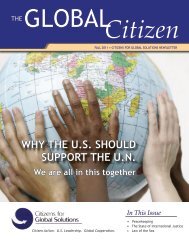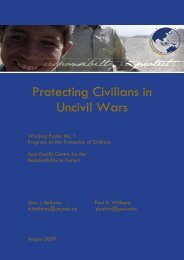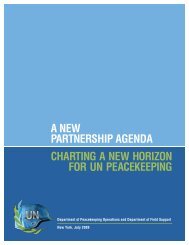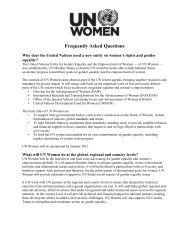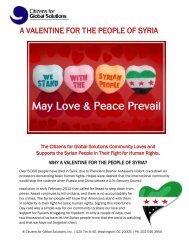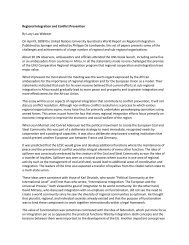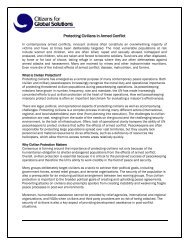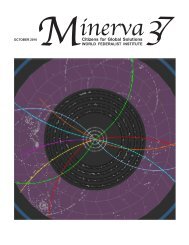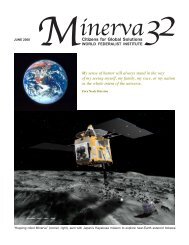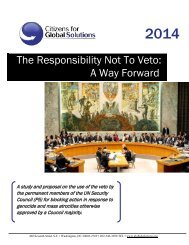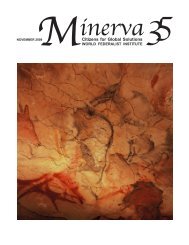adopted, this time the study focusing oneducation, followed by discussion of thecurrent study. Another significant agendaitem is a review of how the UN Declarationon the Rights of Indigenous Peoplesis being implemented in communities andcountries. The most dynamic discussionwith a rapid result, usually in the finaldays of the session, is the agenda item onproposals to be submitted to the UN HumanRights Council <strong>for</strong> consideration andapproval. Indigenous peoples and civilsociety present their five-minute interventionsand, be<strong>for</strong>e leaving Geneva, can seeif their proposal will move <strong>for</strong>ward to thenext phase. This July, ten proposals weredirected to the UN Human Rights Council.The proposals included a continuation ofthe discussion on decision-making, withspecific focus on extractive industries onindigenous peoples lands.The first proposal put <strong>for</strong>ward the necessity<strong>for</strong> states to strengthen NHRIs andfir increased future partnership betweenNHRIs and EMRIP. The second proposalfocused on the UN Human Rights Councilprioritizing indigenous peoples rightswith regular panels relating to the studiesand imminent issues. The third proposalrecommended that the UN Human RightsCouncil implement the study on decisionmakingby including indigenous peoplesat the earliest possible stages of the processrelating to the Council’s five-yearreview and other pertinent matters. Thefourth proposal ensured that the agendaitem on the UN DRIP would continue toreview developments and provide possiblesteps to secure the objectives of theUN DRIP. The fifth proposal built on theaspiration of achieving the articles of theUN DRIP to adopt administrative and legalmeasures that ensure respect <strong>for</strong> realizationof rights.The sixth proposal focused on expansionof the UN Voluntary Fund <strong>for</strong> IndigenousPopulations to allow <strong>for</strong> indigenous engagementwith the UN Human RightsCouncil along with the human rights treatybodies. The seventh proposal focusedon Universal Periodic Review results,including recommendations <strong>for</strong> states.It called <strong>for</strong> a compilation of the recommendationsrelating to indigenous peoplesrights. The eighth proposal requestedan international expert seminar on truthand reconciliation processes. The ninthand tenth proposals called <strong>for</strong> adequateresources of secretariat support and UNspecialized agencies to promote and protectthe rights in the UN DRIP.The fifth session of the UN Expert Mechanismon the Rights of Indigenous Peopleswill continue the important work launchedby the UN Working Group on IndigenousPopulations in the early 1980s. EMRIPhas a new mandate under the UN HumanRights Council and is maturing in a mannerto ensure equality and demand dignity<strong>for</strong> indigenous peoples.II • ACSC/APF ~ Asia is often seen asan abyss in regional activities, especiallyconcerning human rights promotion andprotection. For decades, Europe, Africa,and the Americas plodded along, providingcommissions & courts and increasingtheir influence toward more jurisprudence<strong>for</strong> justice. The grassroots peoples’ movementsin Asia are mobilizing to bringvalues of human rights to the <strong>for</strong>efront ofcampaigns <strong>for</strong> fundamental freedoms.The Association of Southeast Asian Nations(ASEAN) is a <strong>for</strong>um where freedomis being <strong>for</strong>ged. The10-state regionalmechanism has begun to listen to the voicesof its citizens pressing <strong>for</strong> the values ofdignity, democracy, and human rights tobe included in its daily work. Civil societyis spearheading strategic planning andstructural possibilities <strong>for</strong> initiatives toinfluence this regional body.The creation of the ASEAN IntergovernmentalCommission on Human Rights(AICHR) is the beginning. There areother initiatives in specific fields of rightsthat also are creeping onto the agenda ofASEAN, aiming to move this state-centeredmechanism beyond economics andmilitary security to include solidarity andequality in its principles and policies. TheASEAN Commission <strong>for</strong> the Promotionand Protection of the Rights of Womenand Children (ACWC) and the ASEANCommittee on the ASEAN Declarationon the Protection and Promotion of theRights of Migrant Workers (ACMW)are two institutions mandated to monitor24 • <strong>Minerva</strong> #39 • November <strong>2011</strong>rights that have grown from grassrootsinitiatives. And a recent addition to theannual summits, serving as an incubatorof ideas and initiatives <strong>for</strong> ASEAN, is athe ASEAN Civil Society Conference, aparallel process aiming to add peoples’perspectives to the heart of the regionalbody’s annual agenda.The 7th annual ASEAN Civil SocietyConference / ASEAN People’s Forum(ACSC/APF) took place from 3–5 May<strong>2011</strong> in Jakarta, Indonesia, just prior to theASEAN summit. Human Rights WorkingGroup of Indonesia served as the secretariat<strong>for</strong> this session. Since the introductionof the ACSC at the 11th ASEAN Summitin Malaysia in 2005, the participation ofgrassroots movements continues to grow,gaining greater recognition in the decision-makingprocess of ASEAN.During the seven years, a common agendahas ensured citizen participation andengagement with ASEAN leaders whileenhancing the range of rights <strong>for</strong> a moreinclusive institution. The 7th ACSC/APFcontinued the tradition of a parallel processwith the aspiration of an interfacewith ASEAN Heads of State based onworkshop submissions in recommendation<strong>for</strong>mat <strong>for</strong> the final statement. Thecountry and thematic workshops continueto enhance engagement, allowing the humanrights community in the region toenhance mutual understanding and unity.The workshops are where lessons areshared about past shortcomings and successes,aiming toward best practices andbold policies to promote and protect humanrights in the region.The ACSC/PC program is a combinationof keynote speeches by heroes of humanrights, plenary panels of leading scholarsand social justice advocates, workshopsof strategy and networking, and culturalper<strong>for</strong>mances sharing beauty of art inAsia. Of course, the sense of solidaritydeveloped during all of the above createsa culture of human rights.Aung San Suu Kyi launched the 7thACSC/APF with a videotaped messagecalling <strong>for</strong> civil society in the ASEAN regionto unite <strong>for</strong> genuine participation innational government, gender justice, and
protection of natural resources. Her presenceshaped the main challenge emergingat the event. While it is most obvious <strong>for</strong>Burma, there are similar struggles elsewhere<strong>for</strong> legitimate leaders — from communityto country level — to participatein this annual gathering. Peoples’ movementsfrom across the region showedtheir support, wearing Aung San Suu Kyi“Freedom to Lead” T-shirts with “FreeBurma” emblazoned in all ten languagesof ASEAN members. In most states, suchas Vietnam and Cambodia, the struggle<strong>for</strong> legitimate representation continuesthrough the workshop recommendations.The phenomenon of “people power” tomake a difference in the global humanrights movement caused governmentsto respond. One of the most flatteringresponses has been the creation of fauxNGOs. Governments sponsor groups torepresent official interests at internationalinstitutions and ASEAN meetings. TheGONGO (Government Organized NGO)is a staple of repressive regimes throughoutthe region.During the workshops this is played out inthe creation of recommendations. Therewere 16 thematic workshop tracks withmultiple sessions during the three-daypeoples’ summit. The core themes coverimportant issues in individual communitiesand the international arena, includingnatural resources, fisherfolk, gender andwomen’s rights, climate change, childrights and youth, disability rights, civilliberties, democratization, trans<strong>for</strong>mativesocial protection, agriculture, economicjustice, labor rights, peoples’ regional alternatives,refugees and migration, peaceand security, and minorities/indigenouspeoples and LGBT (sharing a workshop).Health was a special focus <strong>for</strong> the JakartaACSC/APF.Because of the demands of civil society,ASEAN is showing signs of addressingshortcomings with regard to human rightsby way of new institutions. What is importantwill be if civil society can continueto shape these new entities. The adoptionof the ASEAN Charter in 2007 was asignificant step toward a more legal institutionwith provisions endorsing humanrights. Shortly thereafter, the ASEAN IntergovernmentalCommission on HumanRights (AICHR) was created on October23, 2009, and the ACWC on the rights ofwomen and children was created on April7, 2010. Both are important instrumentsthat civil society must organize to allow<strong>for</strong> individuals and communities to beincluded. The democratization of theseinstitutions is essential <strong>for</strong> future engagementto guarantee freedom. So far, onlytwo states — Thailand and Indonesia —have nominated human rights advocatesas commissioners. The important workwill be to gain representation of more humanrights practitioners among the 10 positionsof the AICHR. The human rightsmechanisms of ASEAN are a milestone inits history. However, much more must bedone to enhance equality and dignity <strong>for</strong>the peoples of the ASEAN region.In Jakarta, civil society stood up <strong>for</strong> rights,demanding that their governments live upto international human rights standards.They called <strong>for</strong> ratification of various internationalinstruments and implementationof specific articles to improve livingconditions. There was a call <strong>for</strong> AICHR tomove beyond its non-interference principleto examine human rights in each countryand not only focus on regional issues.The monitor and respond functions mustextend to specific state situations. Therewere also calls <strong>for</strong> greater transparency inthe AICHR and <strong>for</strong> increasing inclusionof civil society in the deliberations. The7th ACSC/APF strengthened solidarityin the region and was an important incrementalinitiative <strong>for</strong> ASEAN to contributeto a just global community.Every year, peoples’ movements creativelycoordinate campaigns that trans<strong>for</strong>mregional institutions to reflect the interestsof citizens. With the development of theACSC/APF there is measurable progresstoward peace and human rights. The 2012ACSC/APF in Cambodia offers anotherpossibility <strong>for</strong> the new institutions <strong>for</strong> humanrights to guarantee dignity and libertyinstead of allowing member governmentsto limit their role in promoting andprotecting human rights in ASEAN.Civil society came together in the closingmoments of the 7th annual ACSC/APF, playing their angklung instrumentsin unison as a chorus of humanity <strong>for</strong> humanrights. This song of struggle mustcontinue into Cambodia.The main process <strong>for</strong> participation beginsin the workshops. After each workshop,the organizers send the inputs from theirtheme to the conference statement, sharinganalysis along with the top three recommendations.All of the inputs are editedinto one submission by the draftingcommittee and then debated, edited, andfinalized in the concluding plenary, to bepresented to the ASEAN Heads of State.7th annual ASEAN Civil Society Conference / ASEAN People’s Forum, 3–5 May <strong>2011</strong>,Jakarta, Indonesia25 • <strong>Minerva</strong> #39 • November <strong>2011</strong>



